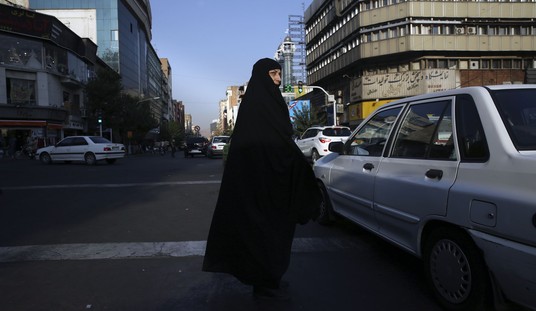For most of his term a slim majority said yes when asked whether they thought foreign leaders respected him — impressive resilience, really, for a guy who was pilloried for blowing hot and cold first on Mubarak’s ouster and then on Morsi’s. Sunni leaders certainly didn’t respect O for that, but then who cares what the oilbags in Saudi Arabia think? Last year, though, the bottom dropped out: Now he’s at 41/53 on the “respect” question. It’s not Republicans who’ve soured on him, either, as they never thought much of O’s international leadership in the first place. It’s independents and even Democrats who’ve lost that Hopenchangey feeling:

My first thought when I saw that was Syria. He was so roundly humiliated by his “red line” last fall, first announcing an attack, then backing off to punt the issue to Congress, then allowing Vladimir Putin of all people to bail him out with a phony disarmament compromise, that even center-lefties can’t escape the conclusion that The One doesn’t know what he’s doing. But then I wondered — how closely did the public follow the whole Syria saga? I know O ended up giving a short primetime speech on it, but I’m skeptical that any foreign policy decision that doesn’t result in war penetrates the public’s consciousness too deeply. I think his falling numbers might be an accumulation of things: Syria, certainly, but also Snowden’s revelations about the NSA data-mining abroad and spying on foreign leaders like Angela Merkel. And there’s surely some irritation over his nuke deal with Iran baked in the cake, especially among strong supporters of Israel. Even Canada’s annoyed with him for his endless dithering on the Keystone pipeline. David Cameron seems to like him okay, I guess. Who else?
Here’s the graph that blew my mind. Americans’ satisfaction with the country’s place in the world goes south under Bush as the Iraq war drags on — but it never recovers. Compare the numbers in 2007, at the height of sectarian violence in Iraq, to the numbers today.

Identical. Nothing Obama’s done, including total withdrawal from Iraq, has moved the needle much; last year’s modest improvement was, I suspect, more a boost he got after his election than a reaction to anything that happened abroad. I’m tempted to say that some of this is a response to the lack of U.S. leverage over the Arab Spring, but that doesn’t work. The numbers are almost the same from 2010, before the revolution in Egypt, to 2012. Maybe there’s simply nothing the White House can do to improve this metric short of winning a war or riding a major economic recovery. The latter would at least restore some sense among the public that “America’s back” rather than an empire in decline.
Exit question: Will numbers like this make O more or less inclined to be bold vis-a-vis Ukraine and Venezuela? Maybe he figures he should cut his losses and not challenge Putin to another game of chess. Checkers, i.e. approving Keystone, seems hard enough for him. But then, there’s nothing happening domestically for the rest of the year, and maybe for the rest of his term if Republicans can’t put something together on immigration. That’s why lame-duck presidents tend to focus on foreign policy in their last years in office. If/when the Iran nuke detente falls apart, he won’t have much of a legacy abroad either. Maybe a firm line on Ukraine against Putin will be his way of recovering some respect.








Join the conversation as a VIP Member